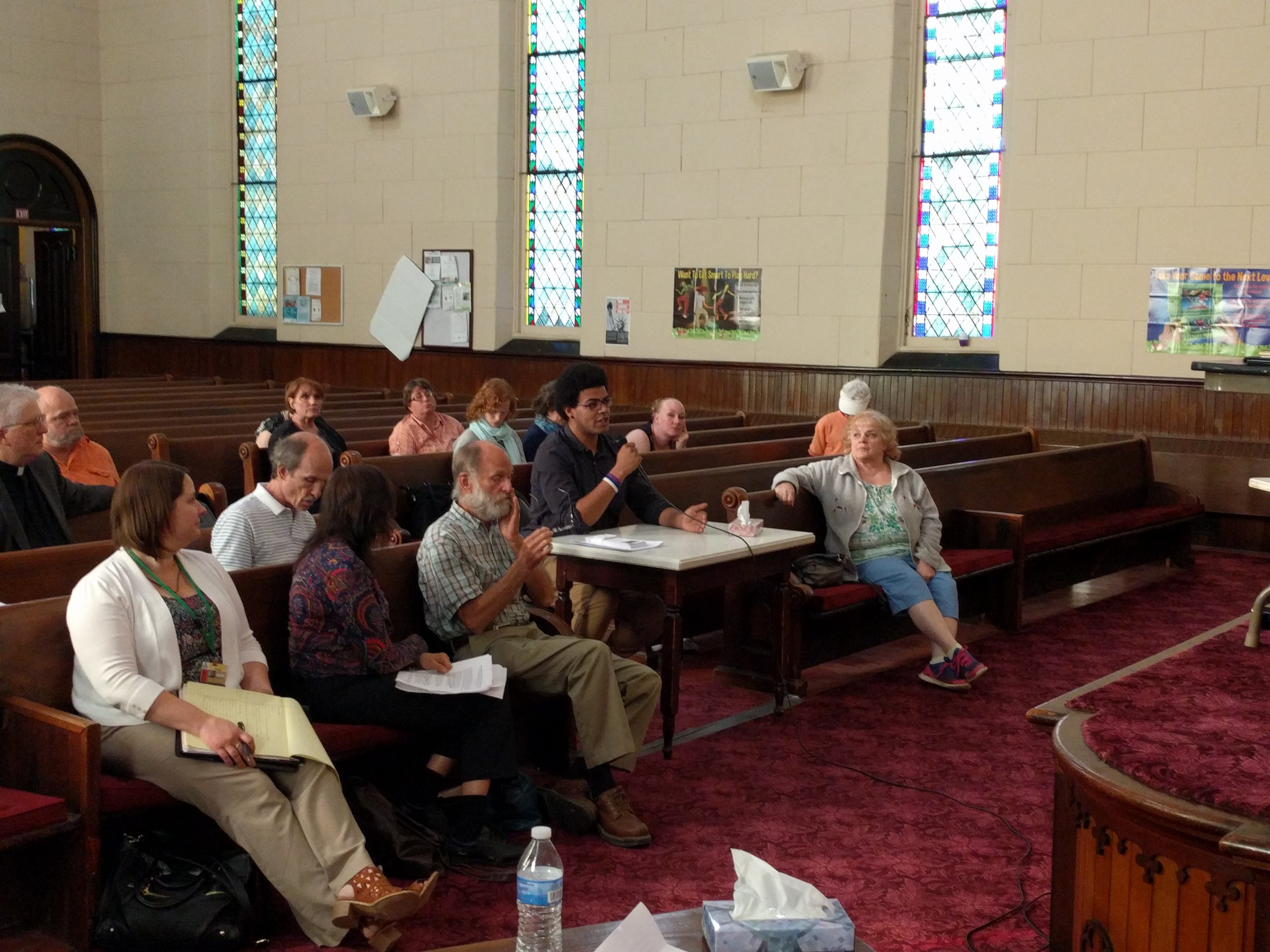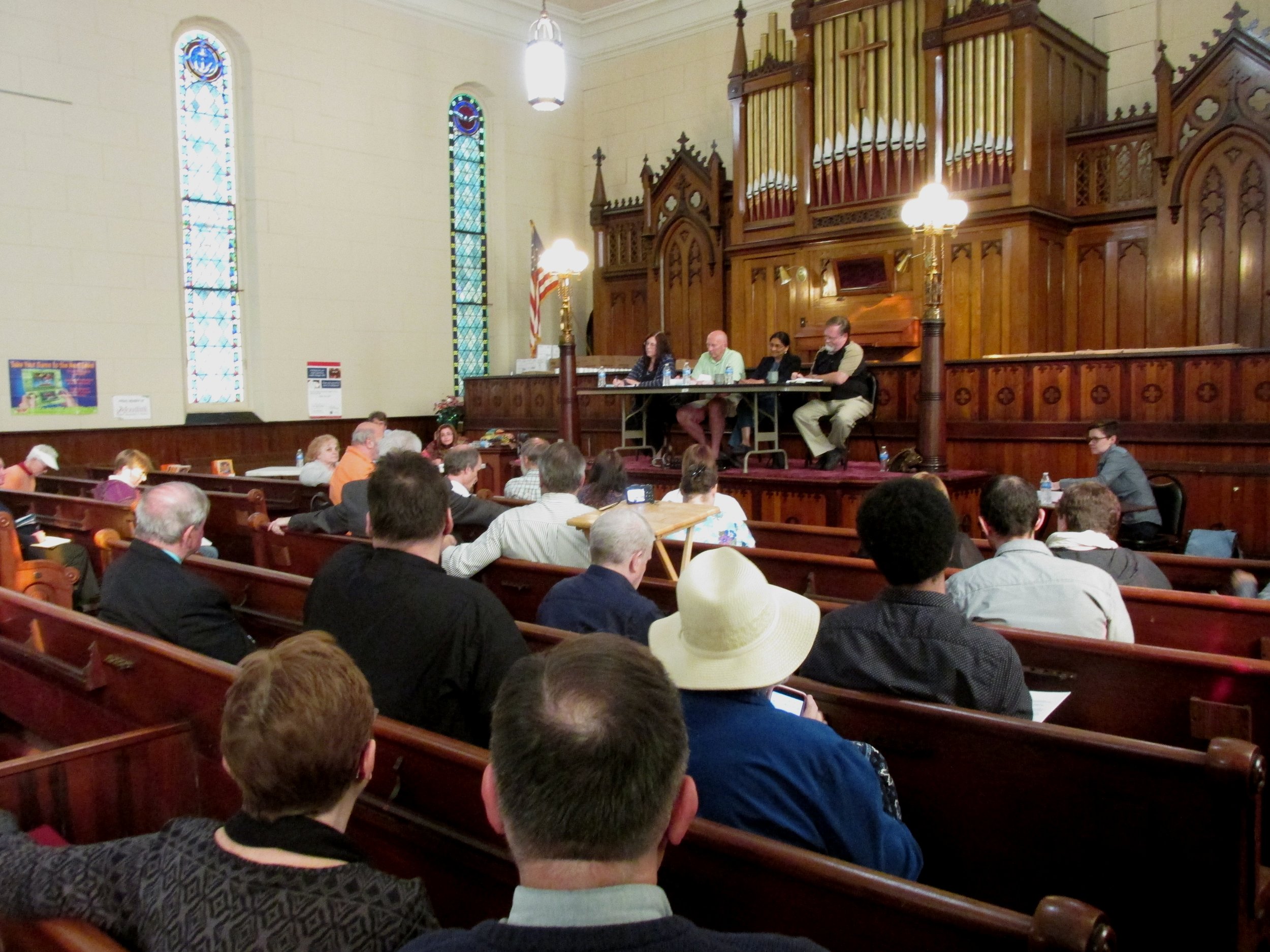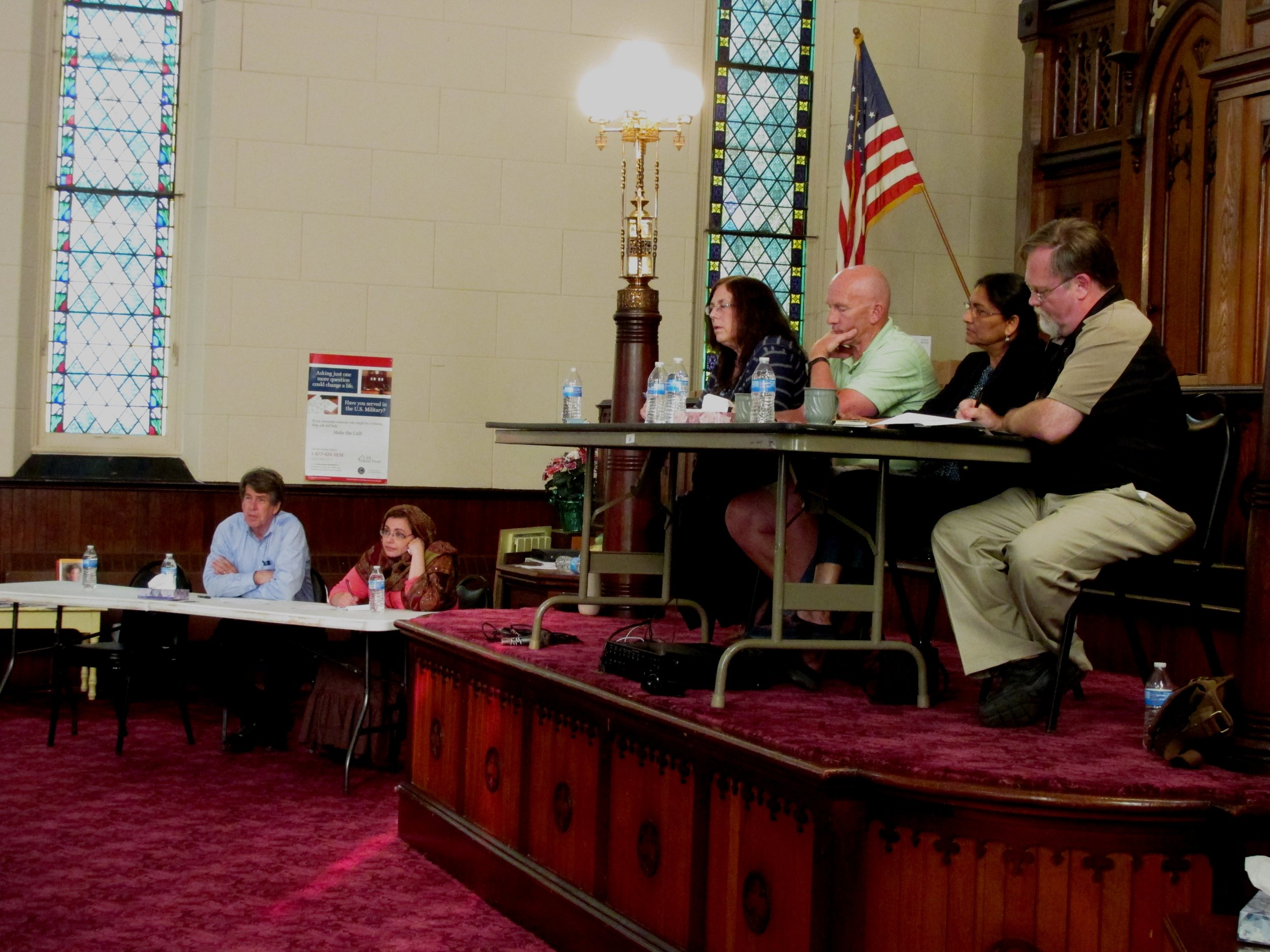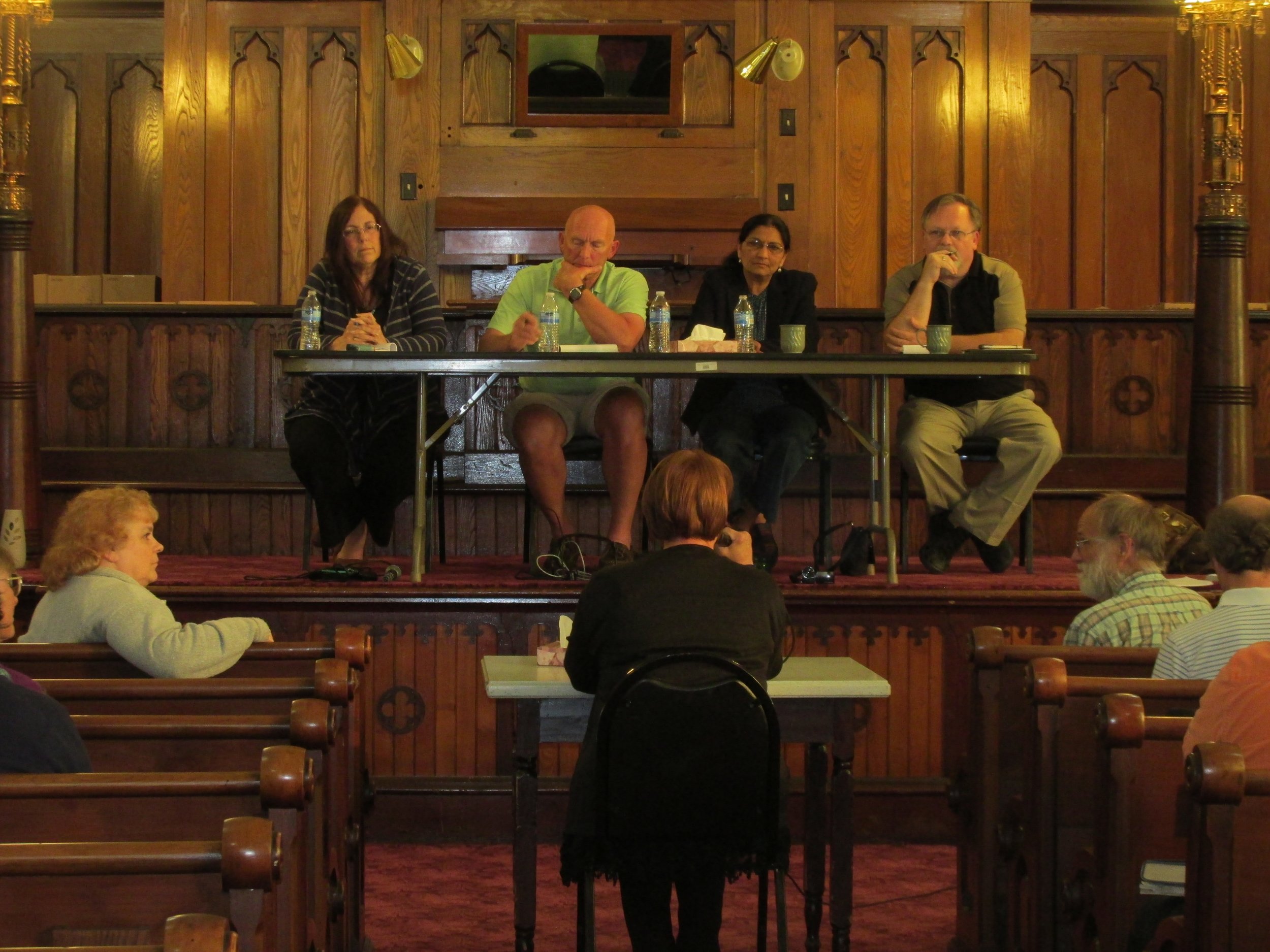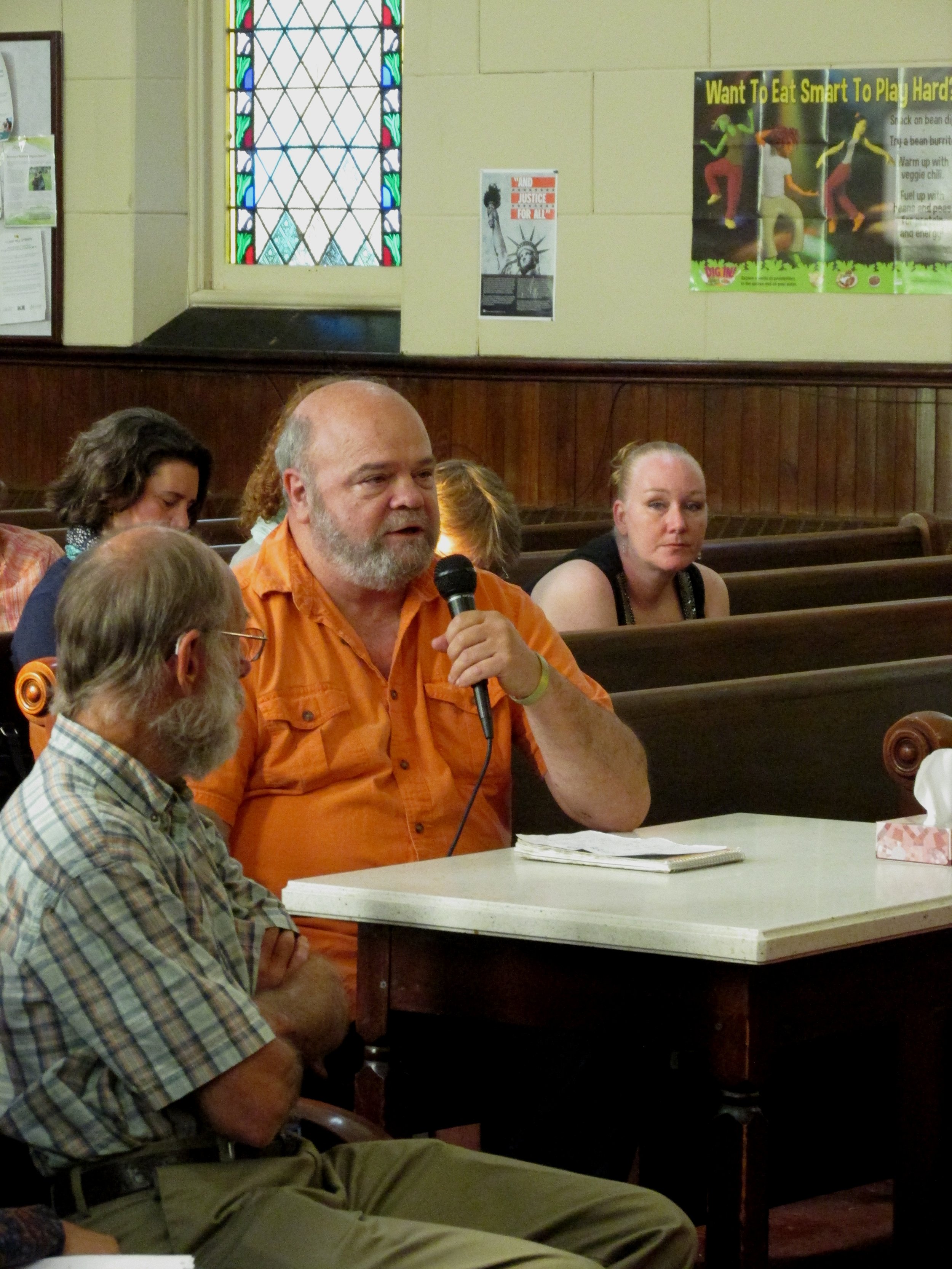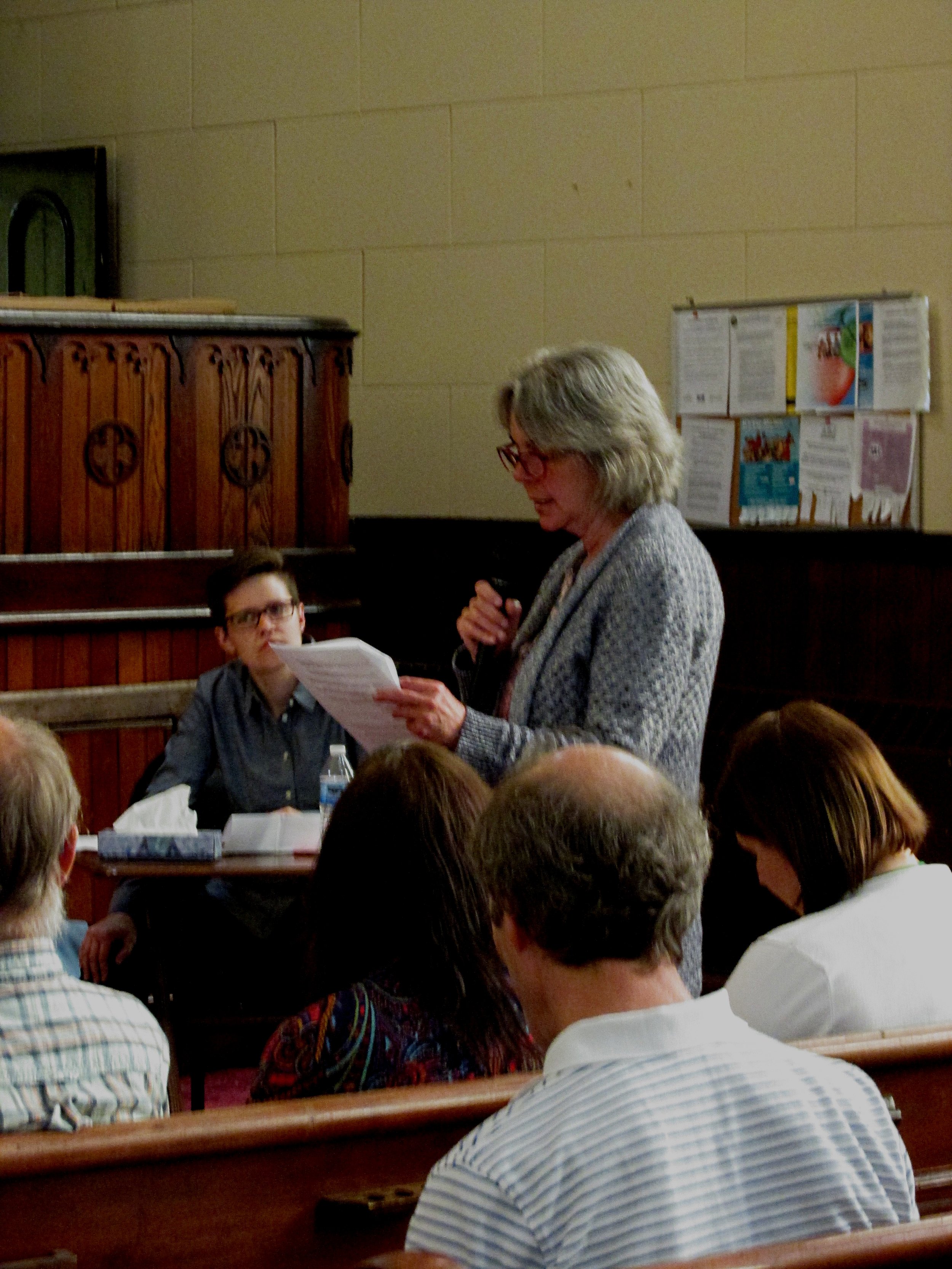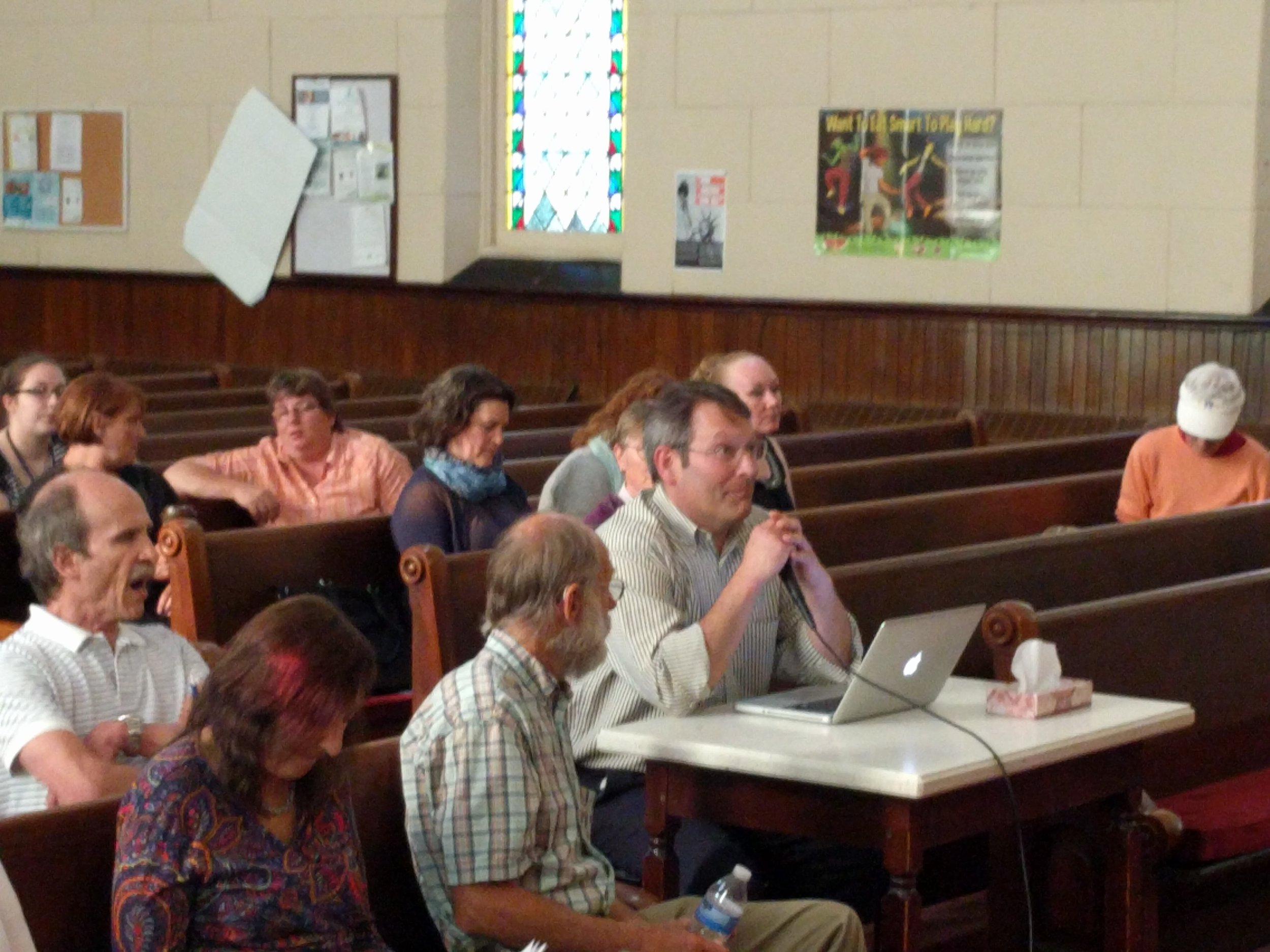Neighborhood Check-In: Southern Tier - Cuba, NY
Event Description
On Thursday, June 1st, 2017, 58 people gathered at Cuba Cultural Center in Cuba, NY, for the first of what would become three Neighborhood Check-Ins within the Southern Tier, and the first Truth Commission on Poverty in New York State. The event began with the sharing of a meal. The commissioners’ panel consisted of local leaders representing faith communities, labor, local government, and community organizations. The commissioners included four local representatives from the area, one state commissioner from the Hudson Valley, and one national commissioner from the Kairos Center. Testimonies began with the sobering presentation of state and regional poverty statistics. Additional statements were received from eight people on their contextual, lived experience with economic hardship. Their comments spoke directly to the challenges and traumas they experience as people struggling with the injustices of poverty. Five individuals who work as advocates and service providers also shared important content based upon their years of service with marginalized and economically disenfranchised residents of the Southern Tier.
The particular transportation challenges of rural regions made attendance at the Cuba event impossible for some individuals. At their request, two additional listening events were scheduled in Olean, NY. The first of these additional Check-ins was held at the Olean Meditation Center, on June 29th. Eight people attended this check-in, where three of the Southern Tier Commissioners received testimony. Three young adults with contextual experience, one community member, and an attorney who has practiced in the area for some time, gave testimony that day. The final Southern Tier Check-In was held at the African American Center for Cultural Development, in Olean, on July 22nd. In addition to two regional commissioners, eleven community members were in attendance, listening as two people shared their personal experiences of injustice and poverty. Three service providers were in the audience at this last event. One of them, a local pastor, shared the great level of fear which individuals expressed to her personally at the thought of publicly sharing their lived experience with poverty. Because of this fear of retaliation from within the community, providers shared on their behalf.
Co-Sponsors: Labor-Religion Coalition of NYS, Cuba Cultural Center, ACCORD, Fiscal Policy Institute, New York State United Teachers, Food Bank of the Southern Tier
Testifiers (and organizations, where applicable)
Ron Deutsch, Fiscal Policy Institute
Twila Barr, reading for Tonia Spencer
Chuck Anthony
Amber Bell
Jacqueline Bogart
Bobby Black, Justice and Unity for the Souther Tier
Elizabeth Ludvik
Barbara Dyskant, Campaign for NY Health
William Martin, Justice and Unity for the Souther Tier
Patti Clapp
Teri Violet
Rev. Peter Cook, New York State Council of Churches
Chris Stanley
Anonymous Teenager
Tristan
Stacey
Karen Warren
Rich Esposito
Anonymous Adult
Rev. Kim Rossi
Jil St. Ledger-Roty
Barbara Casey
Dean Kent
Written Testimony
Rosemary Pellett
Anonymous
Video
Written Testimony
Rosemary Pellett
For 24 years I had a career in nursing, which was everything to me. I never wanted anything more. I continued to work for 3 years after my back and neck issues started affecting my everyday life. I hid the extent of my pain and discomfort from family, friends and my doctor. In 2013 I came clean with my doctor and due to having no insurance she continued to help me attempt to control my pain with medication and I continued working. I remember days driving home from work that year having to pull over on the highway and just cry in pain and discomfort, sometimes not knowing if I would be able to get home on my own. I had been in the process of starting another job when my doctor received the physical expectations for the new job and would not sign off. She expressed enough is enough, and told me she felt I was doing more damage by continuing to work. I made an attempt to change her mind, asking what I would do to support myself, and she suggested applying for social security disability. It took a couple weeks after that for it all too really sink in that this was not going to be a short term issue, it was long term and I realized I no longer had a career. She also at this time referred me to an orthopedic doctor but due to no insurance I was unable to start seeing one for several months when I would become eligible for Medicaid. I was able through Lourdes patient financial assistance program to continue seeing my primary doctor. The first few months I managed financially on my own without asking for help, after which I had no choice but to apply for public assistance cash, food stamps and Medicaid. Once I became eligible for Medicaid I started going to an orthopedic doctor who put me on restrictions which included no bending, twisting or lifting over 10lbs. I did attempt to find another job, it didn’t matter what at this point, but no one would hire me with my restrictions. At this point I came to realize just how quickly I could have became homeless, I had no income, the cash assistance I got went in a voucher directly to my landlord and not enough to even pay my rent. That is where my son (George) and nephew (Billy) saved me, if it had not been for them, who agreed to pay the balance of my rent, utilities, car insurance, gave me gas money frequently and bought toiletries and personal items. This may sound unbelievable but I bought soda with food stamps which I felt guilty about but those bottles and cans helped me more times then I can count paying my dollar co pay for my prescriptions. This is also when I found out about the food pantries in Owego, Rural Ministries. Even after finding out they could help it still took me a couple weeks to get the strength I needed to walk thru the door the first time, but at this point I was living in poverty, had never struggled like this in my life, and asking for help was not the easiest thing for me, but I really needed food and toiletries such as toilet paper, shampoo, conditioner, toothpaste, and soap. I could have asked my son and nephew but they were already doing so much. The first time I walked into Rural Ministries was not the best experience, but the next time changed my life, this is when I met Sister Mary for the first time and my life started changing. It still was not easy for me to ask for help every month but I really had no choice. After going monthly to Rural Ministries for food, toiletries, and gas cards for well over a year, when in April 2015 my son found an apartment for rent in Waverly, I was devastated at the fact I would have to start going to another food pantry. I remember standing at Rural Ministry and talking with volunteers. I was in tears. I had come to know numerous people from Rural Ministries and honestly did not know how I would walk into yet another pantry. One of the volunteers told me to talk to Sister Mary, at first she said I would have to change, and then made exception. It was more of a relief then you can imagine. (Walking thru the doors the first time at Rural Ministries improved my quality of life and I will never forget this).
To tell you why I wanted to be a part of the speakers bureau I would like to start with how it came to be for me. Not only was I a caregiver by profession, but also by personality, and helping others was what made me happy, actually complete, gave me purpose. During this time I was also grieving the loss of my career. I had been stuck in denial for almost a year, which only increased my anxiety. I have had social anxiety for years, and now grieving the loss of my career, only increased my anxiety and feelings of worthlessness, the thought of where I was emotionally was scary. I found myself wondering what I would do with the rest of my life, I had no purpose, no direction in which to turn, feelings of going down a road just to find it is a dead end. I saw no light at the end of the tunnel, would describe some of the feelings. I had a hard time going places to begin with and with my financial situation for over two years it got to the point I rarely left my house. During these months I felt was an extreme low point in my life (actually I referred to these times as being in a black hole sometimes standing on the edge, which was a good day, hanging from edge or falling in the black hole was very dark difficult times for me.) Around some of the most difficult days is when I was asked by Sister Mary from Rural Ministries if I would participate in the food focus group. I had come to respect and think the world of Sister Mary and could not tell her no, which gave me the strength to attend the group, I feel Sister Mary somehow knew that and if not I hope she knows now how she helped me to find a purpose and not only change direction to actually have a direction, in which to go. The food focus group is where I met Randi. Randi along with food bank of the southern tier gave me opportunities to have my story heard and made me realize that I, with others like me and in the same situations have a voice and can make a difference. Randi continued being a part of my life. I was asked to do a television interview first, the night before I became physically ill but I forced myself, this is when I started to realize that mine and others like me, our stories could really help raise awareness. I went on to also do a newspaper interview. When I heard about the speakers' bureau classes I was asked to be a part of this and knew I had to and wanted to be included in this class. Then I was asked to sit on a panel at the annual Food Bank of the Southern Tier celebration, my experience there changed my life yet again. I mentioned earlier that I remember pulling over on the highway on my way home from work and crying in pain, well the next drive home that means a lot to me is the one after I was a guest speaker on this panel on my way home from the celebration. I remember feeling like a weight had been lifted from my shoulder and remember crying, but this time not in pain, reality hit that day on the drive home to just how much we can help raise awareness, that I really could make a difference and that I no longer had to feel I didn’t have a purpose because I know I do thanks to Rural Ministries, Randi, Jen and Food Bank of the Southern Tier, helping to find my voice and get through my fear and social anxiety.
Being a part of the speakers' bureau has already helped me with speaking in and getting out in public. Also I need the help and all the information I can continue to get to be able to present myself in front of large groups so people will listen and really hear what we have to say because we have been through it in the worst ways and understand from first hand experience what it is like to be hungry and to live in poverty. Due to the speakers' bureau I have also gained knowledge of other organizations to assist with speaking in public and different things that can be done through the anti hunger task force, both of which I hope to become a part of. I would like to thank Linda and Matt for showing us what Toastmasters was all about and how it can help us succeed and also Nancy for the awareness of the task force. Just when I had been feeling like I would never have a purpose I have the knowledge and understanding to continue to grow with experience through the speakers' bureau, and to go on to help and support others with their long, hard journeys, to give back and to help others going through what I went and still am going through, it costs nothing to share our stories. For myself, it has helped me in so many ways, getting me out of my isolation, getting out and meeting others that are going though similar experiences that I have and continue to go through on a fixed income (I did after 2 denials from social security have my appeal hearing and was approved to receive benefits Jan. this year 2016) I still struggle daily with my pain & my financial status. To help get awareness of hunger and poverty out to the public and be able to do it in a way they understand the need, and that we didn’t ask to be living in poverty.
Thank you all for being here for support and to listen to our stories. Enjoy hearing the rest of our stories.
It has been over a year now since this was written and would like to add some things I have done. I have volunteered at Catholic Charities food pantry for the past year, also pick up bakery donations from Tops Market to take to pantry, I have met several various vendors who donate also snacks and staples at times. Have done several more speaking engagements, went to Albany, NY for lobby day, while in Albany had the opportunity to meet 1 on 1 with Senator Fred Akshar (met him face to face again at a town meeting in Owego, NY), helped with donations for the pantry during hunger action month in Sept. 2016, (looking forward to doing again this year) and again helped to raise money and donations of food for the holidays also in 2016. There is much more detail to all the things mostly which I have done with the Food Bank of the Southern Tier Speakers Bureau. The last thing I was involved with, was asked to speak at the Catholic Charities annual fundraising dinner, which I did do. I am going to close for now but much more to come.
Anonymous
Five years ago I moved to Allegany County, NY following receiving a Master's Degree and a job in the area. This was the first time I was away, far away, from family and my safety net. My first few months here were wonderful, but then I started to experience an uncontrollable level of depression and anxiety - I mean I've always been a nervous type and my mood always run slightly lower than those around me, but this was different. I did not have an established doctor, so when symptoms reached an unhealthy level (I couldn't drive or look at my car without creating a high level anxiety and I could no longer eat due to nerves), I started to reach out to doctors. There are only a limited number of doctors in the immediate area - walking distance as I was no longer driving - even fewer who will start with new patients with a short waiting period - 8 weeks for a doctor in my town! I knew I couldn't keep living like this for that long, so I eventually built up the courage to go to a doctor 20 minutes away where I wouldn't have to wait. However, this wound up being a poor choice - the doctor prescribed medication that was hell both to start and stop, a super-strong synthetic opiate - one which I could feel symptoms of withdrawal from for years after discontinuing the medication. Following this appointment, the doctor informed me that I would have to find someone to continue prescribing the medication, on my own, without help from the doctor's office. She also informed me that if I wanted county help, I would have to drive to Wellsville on a Wednesday during the day to wait to be assigned a 'first come, first served' counselor... How was I supposed to take off work and drive (an anxiety provoking activity) to find this sort of help? Mercifully, I was seeing a counselor within walking distance, albeit one that did not take insurance or was certified to prescribe medication. She helped me find someone about 20 minutes away to prescribe medication.
A couple months ago, about 4 years after my initial episode described here, I again found myself in the throes of depression and extreme anxiety, this time unable to drive and touch anything - I was terrified about transmitting germs. As someone who works with the public, this was crippling. By this time, I was finally able to get in with the amazing general practitioner in my town who was attentive to mental health concerns. She prescribed a safer, effective medication, but I still needed to find a counselor (I was unhappy with the former counselor who prescribed medication) who worked with my insurance. After she calls saying, no we're not accepting new clients, I finally found someone - again, someone 20-30 minutes away - an almost crippling distance. But even with decent insurance, it became cost prohibitive.
Not only is finding mental health services difficult with limited practices in the immediate area, but the cost for mental health services is nearly impossible to pay. I have a great deal of student loan debt, but I have been blessed to have medical insurance coverage my whole life. Even with decent medical coverage, the first medication I took cost $100 a month, quarterly sessions with the psych nurse practitioner were $60 for less than 15 minutes of "How are you? Ok, good, here's your script," and almost weekly counseling sessions with someone who was amazing (but didn't take my insurance) were $50 per hour session. As I struggled this time, I started taking a less expensive medication, less than $10 a month, but the trips to the doctor cost over $100 per visit, and a counselor who accepts my insurance costs $120 an hr who I have stopped seeing after realizing the insurance is not covering anything, plus $50 a session for the same local counselor who doesn't accept my insurance that I was seeing before. In the four years between my initial 'episode' and my most recent issues, due to a number of reasons, I have weathered some serious down periods without any medical intervention - some reasons including fear of cost and side effects of medication and just general ignorance about what to do to get the help I needed. When I was struggling the first time, I was single and as someone with student debt and not the best paying job, I barely made ends meet while trying to manage my mental health.
In an impoverished and rural area, mental health services are so limited and expensive. Not only is seeking treatment expensive, but there is a stigma attached to this type of illness which makes people (like me) less likely to discuss problems for fear of it affecting their job or the way others view them. An estimated 1 in 5 people will suffer from some form of mental illness this year, how many of those who suffer will go without treatment because of the cost or lack of resources? I'd like to finish my testimony with a quote from one of my favorite books, "Furiously Happy" by Jenny Lawson and ask the commissioners to consider the interaction between poverty and mental health - “We listen to the small voice in the back of our head that says, “This medication is taking money away from your family. This medication messes with your sex drive or your weight. This medication is for people with real problems. Not just people who feel sad. No one ever died from being sad.” Except that they do.”
Further mental health information and reference for mental heath stat above, https://www.nami.org/Learn-More/Mental-Health-By-the-Numbers

